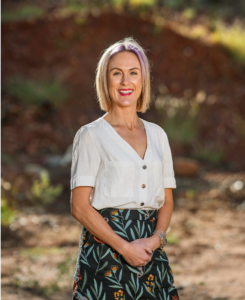A new diabetes program, co-designed with Aboriginal Elders and senior community representatives, will be piloted on Ngarrindjeri country - the Coorong and Murraylands - thanks to recent funding from the federal government's Medical Research Future Fund.
Using a ketogenic eating program and new cutting-edge point-of-care testing technology to monitor health and wellbeing and to motivate change, the program aims to reduce the burden of diabetes in Aboriginal communities across Australia.
"In Australia, Aboriginal people are three times more likely to be diagnosed with diabetes and five times more likely to die from it than non-Indigenous Australians," says Chief Investigator Dr Courtney Ryder, a Senior Lecturer in Public Health, Indigenous Health at Flinders University.
"This burden impacts on the overall health and wellbeing of Aboriginal patients, families and communities. Targeted, community co-designed intervention programs are needed to stop this ongoing cultural devastation."
Over two years, the study will bring together Aboriginal Elders and senior community representatives, clinicians, researchers, allied health professionals and nanoengineers to co-design, implement and evaluate a diabetes intervention program specifically for Aboriginal people living in regional South Australia.

One element of the program will provide the community with access to a new point-of-care insulin test, developed in California and available in Australia for the first time, which can provide an earlier identification of metabolic syndrome than the currently available point-of-care tests (POCT).
This will be trialled alongside a ketogenic eating program, a low carbohydrate diet linked to diabetes remission through the lowering of blood glucose levels and supported by Diabetes Australia.
"Previous strategies to address diabetes have accepted that this disease is an inevitably progressive condition and have aimed to slow the progression and the harmful complications rather than attempt to reverse it," says Dr Ryder.
"These strategies have failed and have left many Aboriginal communities feeling that a diagnosis of diabetes, or its precursor, metabolic syndrome, was an unavoidable death sentence.
"However, recent evidence has demonstrated it is possible to put diabetes into remission, to achieve normal blood sugar levels and sustain them without the need for glucose lowering medication, using a ketogenic diet."
Working alongside the Coorong Diabetes Collaborative, the study will develop a ketogenic eating program, which includes important cultural and contextual factors as defined by the community.
In partnership with Aboriginal people living on Ngarrindjeri country, the team will identify suitable candidates through community screening, develop educational and motivational strategies for the ketogenic diet program, and monitor physiologic, social and economic outcomes.
"The ketogenic diet program is very similar to eating patterns prior to colonisation so this likely puts Aboriginal people at an advantage in regard to uptake of the diet and the ability to maintain it," says Dr Ryder.
"Through community collaboration we will integrate the strengths of Aboriginal dietary knowledge with the strengths of recent scientific evidence on the impact of ketogenic diets on diabetes and metabolic syndrome to pilot a diabetes remission program with and for Aboriginal people on Ngarrindjeri country.
"Aboriginal communities have had access to POCT and dietary interventions for decades, and yet the impact of diabetes and metabolic syndrome continues to rise. By working with Elders and the community we can create a program that is culturally and medically safe for diabetes remission, and suitable for scalability to benefit all Aboriginal and Torres Strait Islander communities."
The project 'Knowledge interface co-design of a diabetes and metabolic syndrome intervention with and for Aboriginal and Torres Strait Islander peoples living on Ngarrindjeri country' has been awarded $756,623.00 by the Medical Research Future Fund Indigenous Health Research Grant Opportunity. Project partners include University of California San Diego, Duke University, Riverland Mallee Coorong Local Health Network and the Moorundi Aboriginal Community Controlled Health Service Ltd.






